I'm An American, And I Didn't Realize These 13 Unspoken Social Rules Weren't Recognized Globally
I'm An American, And I Didn't Realize These 13 Unspoken Social Rules Weren't Recognized GloballySkip To Content
lol Badge Feed
win Badge Feed
trending Badge FeedPosted on Jan 19, 2022
I'm An American, And I Didn't Realize These 13 Unspoken Social Rules Weren't Recognized Globally
"You always leave a tip. Always. Even if the service was unsatisfactory, you show your displeasure by leaving a small tip. But still leave a tip." by Jen Adams Staff
by Jen Adams StaffLink
As someone who grew up in the United States, I'll admit, the country's social etiquette would probably be very confusing to a visitor.
In a Reddit thread started by u/Ilianxxkirby, people discussed some of the social rules that are accepted in the US, but may be considered unusual in other countries.
What are some of unspoken social rules or etiquettes in the United States that may not be commonly known to the average foreigner? from AskAnAmerican We've rounded up some of the most discussed topics, so you can agree or disagree with them for yourself.
Here are 13 unspoken social rules in the US that will make you think, "That's not normal in other countries?":
1. It is generally frowned upon to stare at strangers, or to make too much eye contact with someone you barely know.
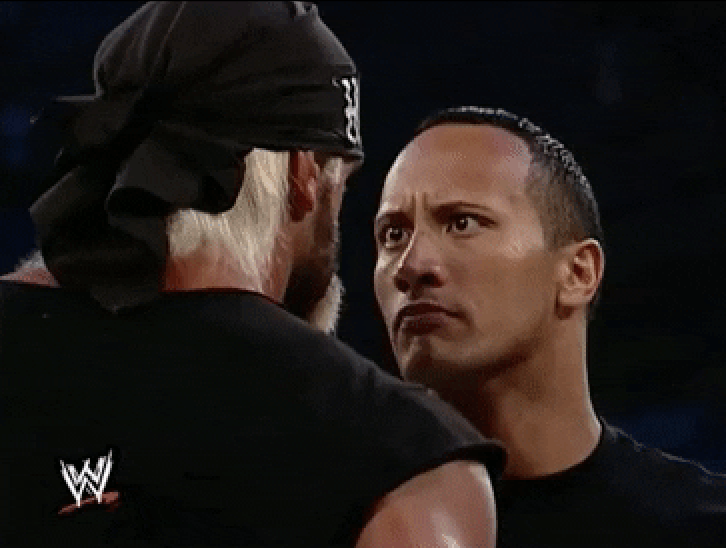
 WWE / Giphy / Via giphy.com "Don't stare at us, we don't like it. Even if you aren't staring at us specifically, just looking in our specific direction can still be weird. We typically make an effort to not spend a lot of time looking specifically at people, to the degree that we actively try to not even seem like we might be staring at someone. This does not seem to be a global thing." —Quantum-Connection
WWE / Giphy / Via giphy.com "Don't stare at us, we don't like it. Even if you aren't staring at us specifically, just looking in our specific direction can still be weird. We typically make an effort to not spend a lot of time looking specifically at people, to the degree that we actively try to not even seem like we might be staring at someone. This does not seem to be a global thing." —Quantum-Connection2. It is extremely rude to comment on somebody's weight.

 Lorne Michaels Productions/ Giphy / Via giphy.com "Don't comment on people's weight or size. In some countries, 'gordito' or similar, for example, might be considered an affectionate nickname. It's unlikely to be taken as anything other than rudeness here. Best not to say anything, even if you think what you're saying is a compliment. We know many foreigners think we're all fat. We know a lot of us are fat. You still shouldn't say anything. And don't point it out if you think someone is really skinny, either." —VeronicaMarsupial
Lorne Michaels Productions/ Giphy / Via giphy.com "Don't comment on people's weight or size. In some countries, 'gordito' or similar, for example, might be considered an affectionate nickname. It's unlikely to be taken as anything other than rudeness here. Best not to say anything, even if you think what you're saying is a compliment. We know many foreigners think we're all fat. We know a lot of us are fat. You still shouldn't say anything. And don't point it out if you think someone is really skinny, either." —VeronicaMarsupial3. Snapping your fingers at a waiter to ask for the check is a big no-no.
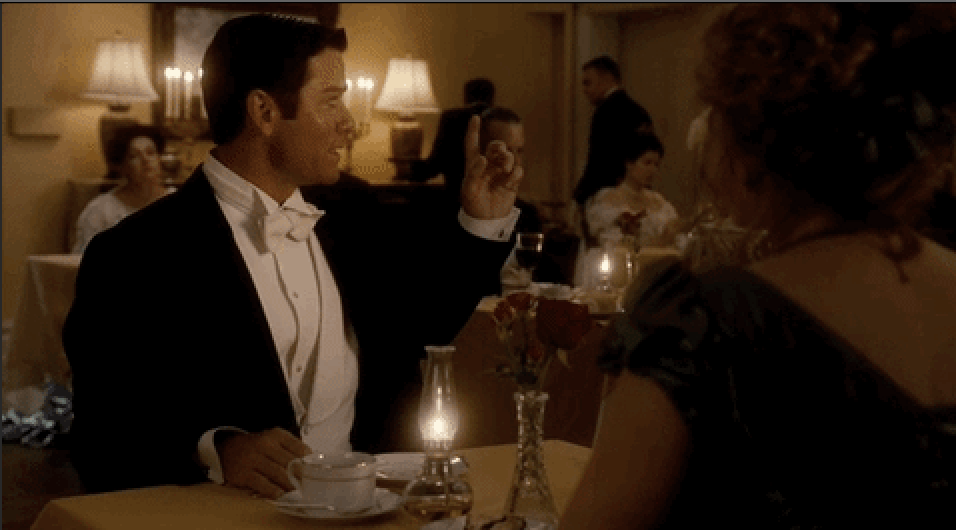
 CBC / Giphy / Via giphy.com "Please don't ever snap your fingers to get a bill from a server at a restaurant. Ever. It's considered very rude. I know it's customary in some countries, so I mention it. If you need the bill, try to get your server's attention by looking directly at them and mouthing or slightly gesturing that you need the bill or need help at your table. They'll get there to your table as soon as they can and then you ask for the bill in person." —tracygee
CBC / Giphy / Via giphy.com "Please don't ever snap your fingers to get a bill from a server at a restaurant. Ever. It's considered very rude. I know it's customary in some countries, so I mention it. If you need the bill, try to get your server's attention by looking directly at them and mouthing or slightly gesturing that you need the bill or need help at your table. They'll get there to your table as soon as they can and then you ask for the bill in person." —tracygee5. In public settings, Americans are big on personal space.
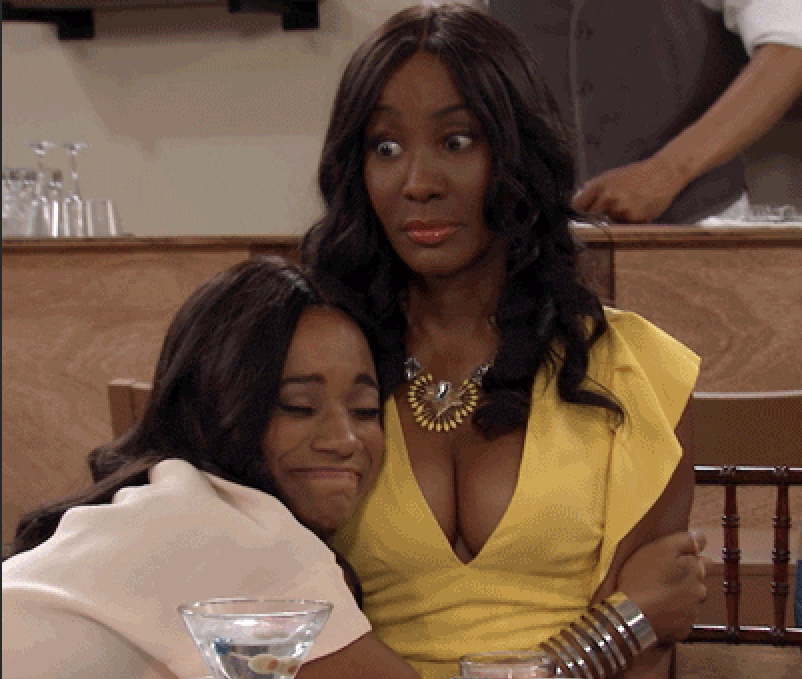
 Bounce TV / Giphy / Via giphy.com "In public places and queues, Americans like personal space. Don't stand closer than about an arm's length away from the person in front of you in a queue, and if that person is using a cash machine, stay about 2 meters back from the person using the machine if you're next in line. If you're talking to strangers, don't get any closer than an arm's length." —adifferentvision
Bounce TV / Giphy / Via giphy.com "In public places and queues, Americans like personal space. Don't stand closer than about an arm's length away from the person in front of you in a queue, and if that person is using a cash machine, stay about 2 meters back from the person using the machine if you're next in line. If you're talking to strangers, don't get any closer than an arm's length." —adifferentvision6. Americans place a bigger importance on lines than some other countries do. Therefore, cutting in line is considered very rude.
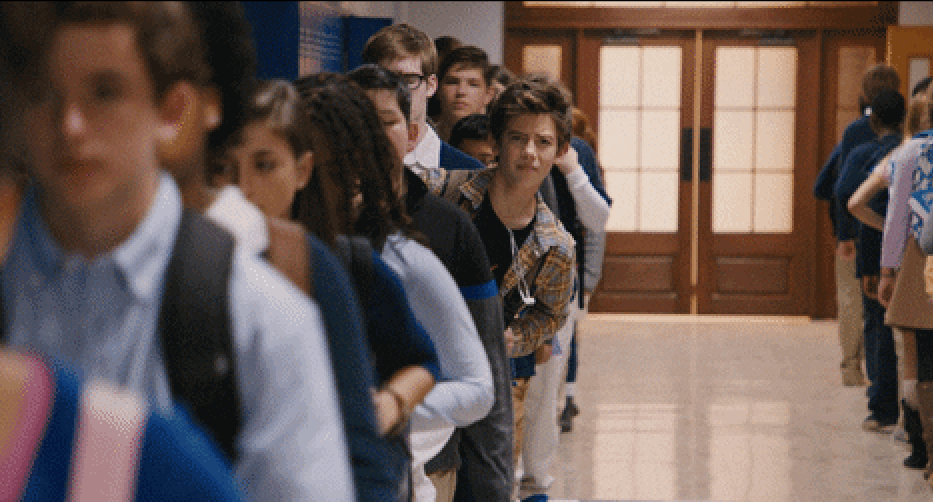
 Lionsgate / Giphy / Via giphy.com "When waiting in line, don’t try to skip to the front. Apparently, we’re touchy about that." —KrAbFuT
Lionsgate / Giphy / Via giphy.com "When waiting in line, don’t try to skip to the front. Apparently, we’re touchy about that." —KrAbFuT7. Most of the time, you can't haggle for prices, and you can't ask the cashier to take off tax.
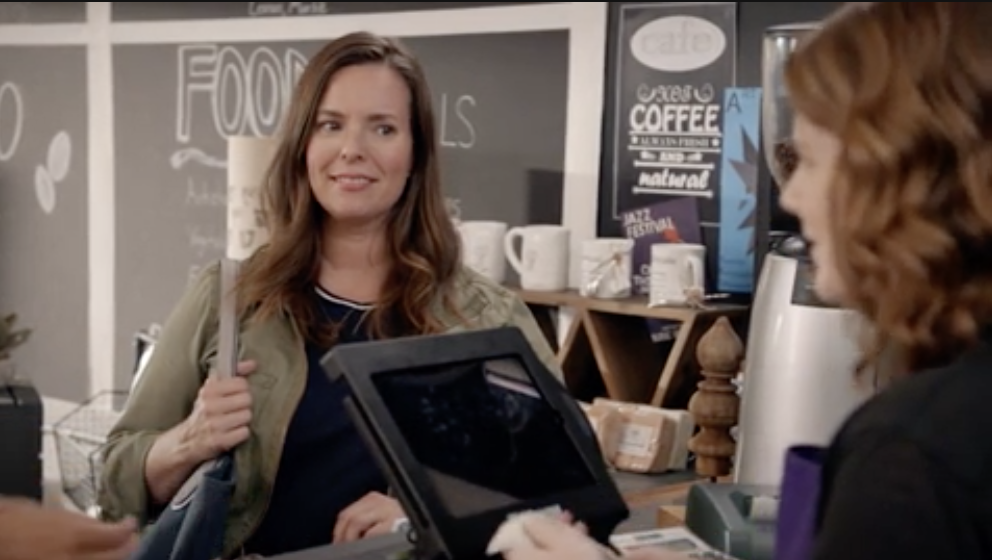
 Tru TV / Giphy / Via giphy.com "Tax is not factored into the price on the shelf, so don't argue with the cashier. They can't change the tax and in the extreme majority of cases, won't remove the tax." —BuckeyeKhanate
Tru TV / Giphy / Via giphy.com "Tax is not factored into the price on the shelf, so don't argue with the cashier. They can't change the tax and in the extreme majority of cases, won't remove the tax." —BuckeyeKhanate8. It is generally considered taboo to mention politics to someone you don't know well.
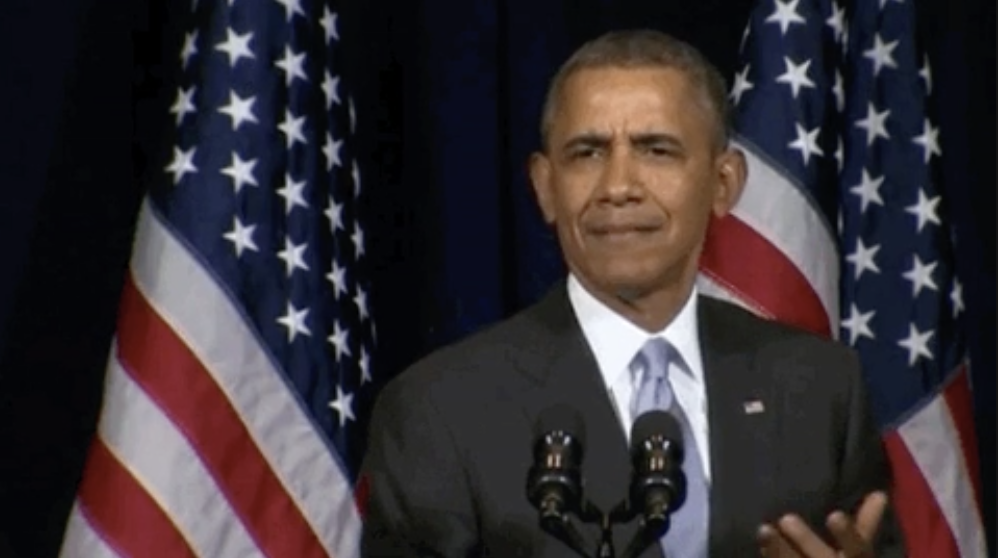
 Giphy / Via giphy.com "Political topics are extremely charged in the US. Americans mostly do not talk about politics casually, and trying to get them to discuss it can be seen as an invasion of privacy." —SillyBlackSheep
Giphy / Via giphy.com "Political topics are extremely charged in the US. Americans mostly do not talk about politics casually, and trying to get them to discuss it can be seen as an invasion of privacy." —SillyBlackSheep9. Americans may invite you somewhere, but it is generally agreed upon that you should not show up somewhere unexpectedly.
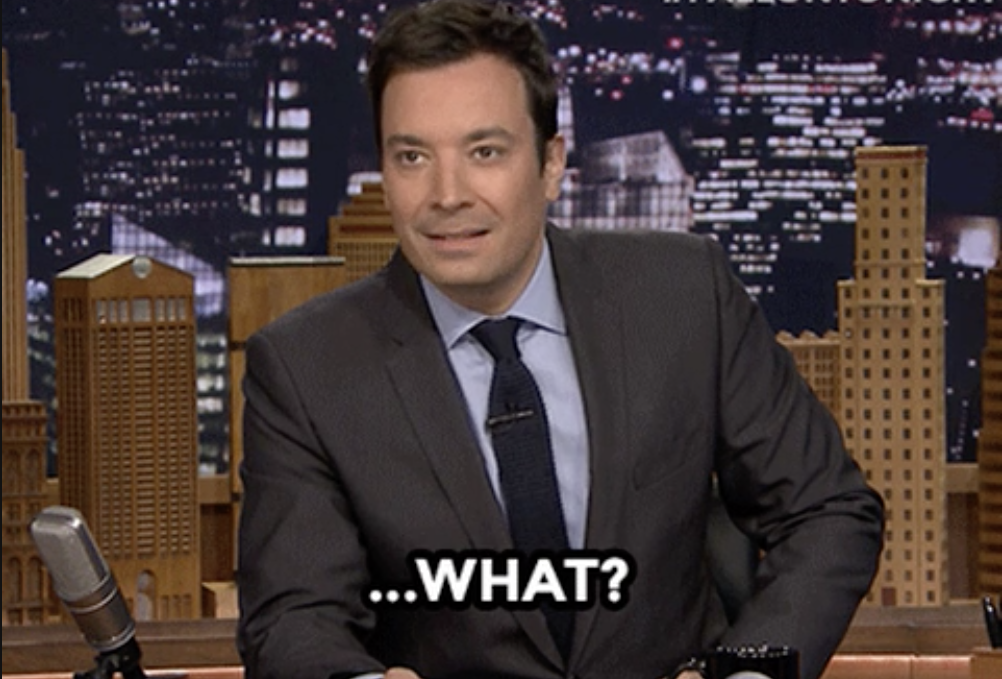
 NBC / Giphy / Via giphy.com "Americans might casually say, 'You should come over sometime! Just come over!' But they actually don't mean 'Just show up at my house anytime and ring the bell and come in for coffee/tea.' It's passively understood that you need to set up a specific date/time and shouldn't just 'drop by' expecting coffee or a meal." —jmochicago
NBC / Giphy / Via giphy.com "Americans might casually say, 'You should come over sometime! Just come over!' But they actually don't mean 'Just show up at my house anytime and ring the bell and come in for coffee/tea.' It's passively understood that you need to set up a specific date/time and shouldn't just 'drop by' expecting coffee or a meal." —jmochicago10. It is rude to ask how much money someone makes, or how old someone is.

 CBC / Giphy / Via giphy.com "It's considered impolite to ask someone's income in the course of casual getting-to-know-you conversation. Asking asking adults their ages is also viewed a bit askance." —fromwayuphigh
CBC / Giphy / Via giphy.com "It's considered impolite to ask someone's income in the course of casual getting-to-know-you conversation. Asking asking adults their ages is also viewed a bit askance." —fromwayuphigh11. When someone asks, "how are you?" no one is actually expecting you to answer honestly.
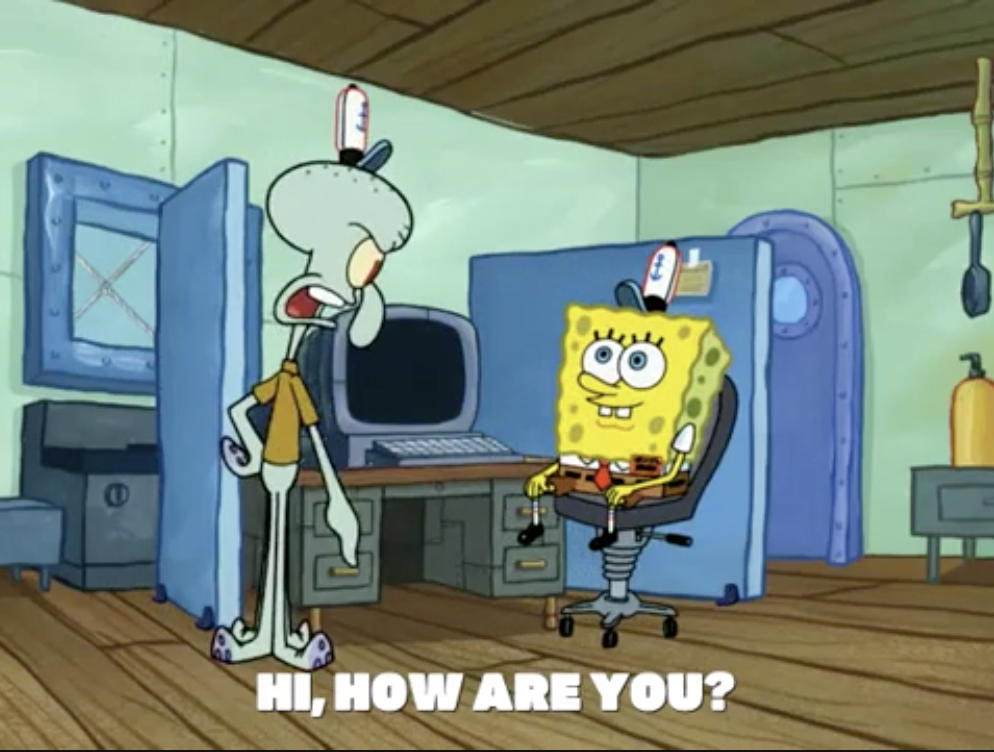
 Nickelodeon / Giphy / Via giphy.com "'How are you doing?' is answered with 'good,' 'great,' or 'fine' followed by 'and you?.' Nobody expects the real answer or an explanation of how they really are, it's a courtesy. If you try to give a real answer, people won't know how to react." —IamREBELoe
Nickelodeon / Giphy / Via giphy.com "'How are you doing?' is answered with 'good,' 'great,' or 'fine' followed by 'and you?.' Nobody expects the real answer or an explanation of how they really are, it's a courtesy. If you try to give a real answer, people won't know how to react." —IamREBELoe12. Not finishing your meal at a restaurant is completely normal, and it is okay to ask for a to-go box.

 Warner Bros / Giphy / Via giphy.com "We have huge portion sizes at restaurants, but you are not expected to eat the whole thing in one sitting. It’s not rude not to finish your meal and get a to-go box. Leftovers are actually kind of a highlight of going to restaurants." —Castern
Warner Bros / Giphy / Via giphy.com "We have huge portion sizes at restaurants, but you are not expected to eat the whole thing in one sitting. It’s not rude not to finish your meal and get a to-go box. Leftovers are actually kind of a highlight of going to restaurants." —Castern13. You should always tip, even if you thought the service was bad.
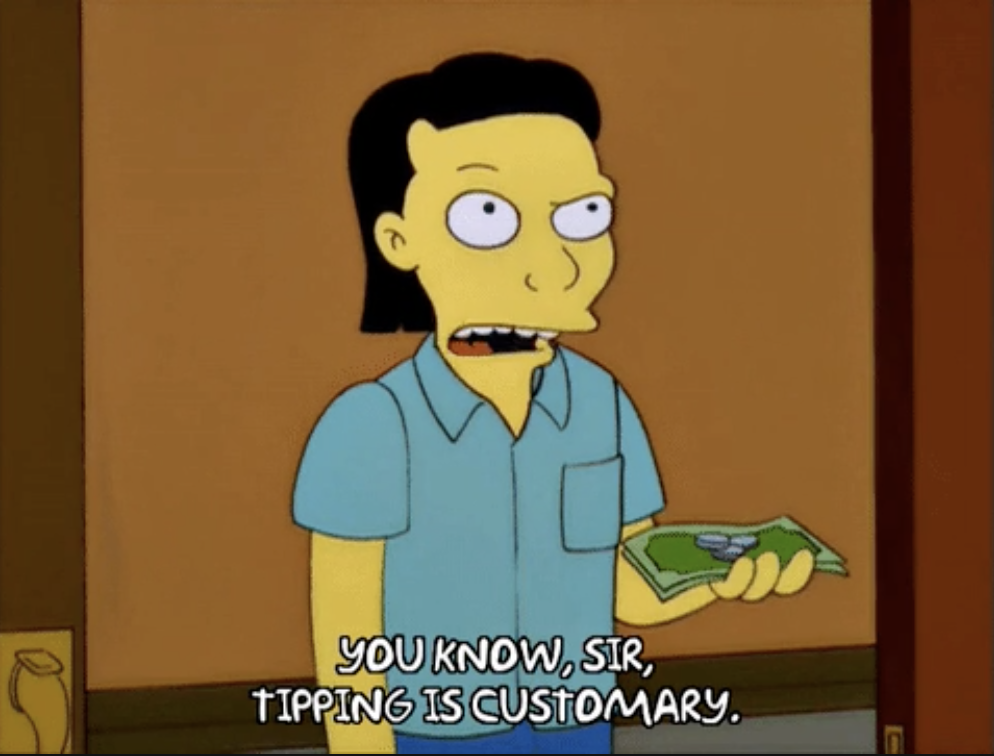
 Fox Broadcasting Company / Giphy / Via giphy.com "I constantly have to explain to visitors that you always leave a tip. Always. Even if the service was unsatisfactory, you show your displeasure by leaving a small tip. But still leave a tip." —notthegoatseguy
Fox Broadcasting Company / Giphy / Via giphy.com "I constantly have to explain to visitors that you always leave a tip. Always. Even if the service was unsatisfactory, you show your displeasure by leaving a small tip. But still leave a tip." —notthegoatseguyIf you're in the United States, do you agree with these? And if you're not in the United States, what are some of the unspoken social rules in your country? Tell us in the comments!
Share This Article
Link